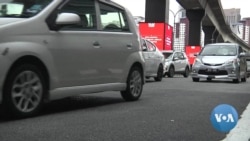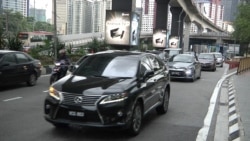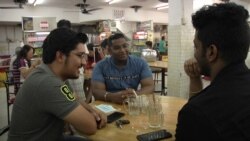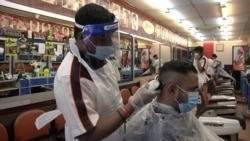Malaysians say they’re feeling both excitement and jitters as the country’s economy opens back up and daily life moves a step closer to normal. Barbershops and hairdressers could reopen June 10, and schools will reopen in phases starting Wednesday.
Rush hour traffic has steadily increased in the country’s largest city, Kuala Lumpur, after a stretch with relatively few cars on the road. Tables at some popular eateries are filling, up, although there are fewer tables available for customers because of social distancing requirements.
“I feel great about it,” said Jeswynna Roy, 39, an English teacher finishing her chicken and rice lunch. “One of the first things I’m doing here is after three months I’m out for a meal with my husband.”
Roy said she feels fortunate because her income and her husband’s are
steady, but they have friends who are not so lucky.
“We know some people who’ve completely lost their jobs who have got no earning power at all,” Roy said.
“They have kids and they have rent to pay or mortgages to pay and there’s no money coming in. It makes me worry, how would you sleep at night, how do they go about day-to-day activities, thinking and worrying about where the next paycheck is coming from?"
Navin Pillai, 23, having a food court lunch with two friends, just graduated a few weeks ago with a mechanical engineering degree. Pillai said he has applied for about 20 jobs but would not be surprised to still be looking for work in a year.
“There’s more competition and fewer job applications open to all these fresh graduates,” he said, adding that there are engineers with several years’ experience who have recently lost jobs.
April data shows Malaysia’s unemployment rate at 5 percent which is a 30-year high.
“We are talking about exports going down, investment going down and consumption probably being affected because of unemployment as well,” said Lau Zheng Zhou of the Kuala Lumpur-based Institute for Democracy and Economic Affairs.
Before the COVID-19 crisis, Malaysia had started a major campaign to lure foreign tourists this year to the country’s beaches, jungle treks and places known for their cuisine, but global travel restrictions have abruptly altered those plans. The country also depends on petroleum exports.
“The drop of the oil prices matters to the Malaysian economy especially on the ability of the government to finance its operations because one-third of our fiscal revenue, our tax revenue comes from petroleum-related sources,” Lau said.
He added that Malaysia’s widely credited steps to contain the coronavirus should allow the economy to recover more quickly than those of other countries in the region but said Malaysia is probably heading toward a recession.
“Malaysian growth depends a lot on the demand globally as well,” Lau said, noting Malaysia has an export-oriented economy.
“We depend on the health of the United States, we depend on the health of China and the region as well. It doesn’t look very rosy now the global outlook,” he said.
Eric Cheah, 61, a construction cost engineer, said his income has dropped significantly since March, and he expects this to continue for the rest of the year. His children are grown, so he doesn’t have to support them, but he and his wife are digging into savings and cutting back on expenses.
“No vacation for this year or next year, I suppose, and less eating out in the fancy restaurants,” Cheah said. He and his wife used to go to a restaurant “once every couple of months, or three months,” he said, “but now we hardly go to a fancy restaurant.”
“So we have to go to a normal coffee shop,” he said.
Changes in people’s spending patterns ripple across the economy according to Lau. He said the country’s stimulus program, which includes wage subsidies, is cushioning the economic blow but the government must start thinking further down the road, with “a mid- to long-term recovery plan to get us out of a crisis-fighting mode and into a recovery stage.”









